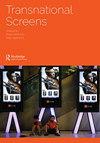Bereft of nature: renegotiating national identity in the films of Rashid Masharawi
IF 0.4
0 FILM, RADIO, TELEVISION
引用次数: 2
Abstract
ABSTRACT This essay examines Rashid Masharawi’s transnationally produced films against the backdrop of problematizing the Palestinian relationship with the realm of nature. Grounded in the idea of minor transnationalism, modelled by Françoise Lionnet and Shu-mei Shih, drawing upon the conceptualization of ‘minor literatures’ of Gilles Deleuze and Félix Guattari, and the transnational film theory of Mette Hjort, it focuses on Masharawi’s feature films, Curfew, Haïfa, Ticket to Jerusalem, Laila’s Birthday and Palestine Stereo. Set in and around refugee camps in the Gaza Strip and the West Bank, Masharawi’s ‘minor films’ accentuate the absence of nature from the lives of local individuals and communities, and their disconnections from the realms of natural transcendence. Masharawi affirms his position on cinema as a vehicle for the advancement of modernity, but does not negate or marginalize the ties of Palestinians to their land. Urging his audiences to contemplate the tropes in the national imaginary and the discontinuities from the romanticized narratives of land in the pre-Nakba period, he seeks what Deleuze and Guattari describe as the ‘collective paradigms of political enunciation,’ corresponding to the new modes of subjectivity.失去自然:在拉希德·马沙拉维的电影中重新协商国家身份
本文以巴勒斯坦人与自然的关系问题为背景,考察了拉希德·马沙拉维的跨国制作电影。本文以franoise Lionnet和shou -mei Shih的小跨国主义思想为基础,借鉴Gilles Deleuze和f lix Guattari的“小文学”概念,以及Mette Hjort的跨国电影理论,重点研究了Masharawi的剧情片《宵禁》、Haïfa、《耶路撒冷之票》、《莱拉的生日》和《巴勒斯坦立体声》。马沙拉维的“小电影”以加沙地带和西岸的难民营为背景,强调了当地个人和社区生活中自然的缺失,以及他们与自然超越领域的脱节。Masharawi肯定了他对电影作为现代进步工具的立场,但并没有否定或边缘化巴勒斯坦人与他们土地的联系。他敦促他的听众思考民族想象中的比喻,以及nakba前时期浪漫化的土地叙事的不连续性,他寻求德勒兹和瓜塔里所描述的“政治表达的集体范例”,与主体性的新模式相对应。
本文章由计算机程序翻译,如有差异,请以英文原文为准。
求助全文
约1分钟内获得全文
求助全文
来源期刊

Transnational Screens
Arts and Humanities-Visual Arts and Performing Arts
CiteScore
0.60
自引率
0.00%
发文量
23
 求助内容:
求助内容: 应助结果提醒方式:
应助结果提醒方式:


